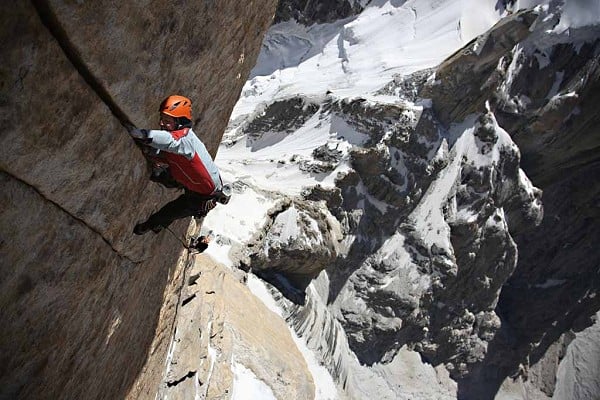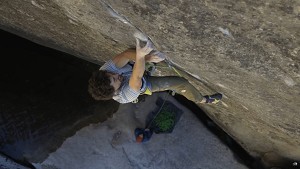
Climbing in two separate teams, Edu Marin, Babsi Zangerl and Jacopo Larcher have all succeeded in freeing Eternal Flame (VI 7c+ [5.13a], 650m) on the south face of Trango Tower (6,240m), also known as Nameless Tower, in the Trango Group of Pakistan's Karakoram range over the past week.
The big-wall route is widely regarded as one of the world's hardest free climbs above 6,000m.

Edu, of Catalonia, was climbing over 28 days with his brother Àlex and father Francisco "Novato" and made the second free ascent of the line since the Huber brothers' first free ascent in 2009, reaching the summit on 21 July. Edu had previously attempted the route last summer, but was forced to bail to due poor conditions and had failed to free two of the pitches, despite reaching the summit.
On Instagram, Edu wrote:
'We sent it!!! We have done the first free climbing repetition of Eternal Flame. I have spent 28 days on the wall and I have sent it in a single push. Maybe I am the first climber who has lead all the pitches free climbing the route. I am eternally grateful to my father and my brother 🙌🏽 Without them this dream would have not have been possible. They have fought to the end. Being the three together at the top of the Nameless Tower has been incredible.'
Edu has climbed at a high level across multiple climbing disciplines, red-pointing 8c at fifteen, on-sighting 8b+ at sixteen and climbing 9a at seventeen. He has climbed sport routes up to 9b and achieved World Championship titles.
In recent years, he has shifted his focus towards hard alpine multi-pitch routes, repeating classics such as the Voie Petit 8b, Wogü 8c and Orabyu 8c across the European Alps. In March 2019, he climbed one of the hardest multi-pitches in the world, Valhalla 9a+ in Getu, China.
View a full timeline of Edu's Eternal Flame ascent on woguclimbing.com [in Spanish].
***
Two days later, Austrian climber Babsi Zangerl and Italian Jacopo Larcher also stood on the summit of Nameless Tower after freeing the line over six days from 18-23 July. They climbed without a single fall during their ascent, which was made in one continuous push — an unprecedented feat.
All but the first two pitches were climbed as onsight flashes. They had already free climbed those first two pitches (also flashed) on their previous expedition in summer 2021.

Babsi and Jacopo chose to 'swing-leads' - meaning they each led alternate pitches. However, they also decided they would both lead the four hard crux (7c-7c+) pitches on the route. All removable protection was placed on lead.
They freed each pitch consecutively. On the second, third and fourth day of their attempt, they made limited progress up the route due to melting snow and ice causing the route to become wet. They waited and were rewarded with good conditions on the fifth day, leaving three easy pitches to climb on the final day before reaching the summit.
A joint statement from Babsi and Jacopo in a press release reads: "Eternal Flame – A Dream came true! An incredible line through the stunning 6,240m high Trango Tower. A sequence of 5 star pitches which we've rarely seen before, with the crux pitch being above 6000m. What a journey! We are both exhausted and baked by the sun, but we're super happy to have climbed this iconic line, without any falls. Now it's time to recover in Basecamp and enjoy our last days in this beautiful country. Big congrats to Edu, for also realising his dream!"
***
Eternal Flame is one of the most famous and classic rock climbs in the world, first climbed in 1989 by the legendary German team of Wolfgang Güllich, Kurt Albert, Christof Stiegler and Milan Sykora. The original ascent was climbed mostly free and required a concerted push from Kurt Albert after Güllich sustained an ankle injury.
In 2003, a team consisting of Denis Burdet, Nicolas Zambretti and Toni Arbones made significant progress in establishing a free line, completing all but one 15-metre section without aid. Two years later, Basque brothers Iker and Eneko Pou unlocked a variation to the blank 15-metre bolt ladder section. Wet conditions prevented a successful lead, but they completed the moves on top-rope.
Making the best of a stretch of good weather between 11-14 August 2009, German brothers Alexander and Thomas Huber finally completed the first free ascent via a crack system to the right of the Pou brothers' solution.

In a UKC article shortly after their first free ascent, Alex wrote: 'We reached the top exactly at noon, all four of us – Mario, Franz, Thomas and myself. Around us all the giants of the Karakoram, inside us a great experience. It sounds like a rock song [Eternal Flame] left embedded in the granite exactly twenty years ago by our great idols Wolfgang Güllich and Kurt Albert. And we are happy for the chance we have had to participate in the development of this exceptional route.'
Read more in this UKC feature from 2009 below:































Comments
Good effort by all of them.
I'm intrigued, however by the use of the word "freed", which always used to mean 'having been the first to climb a route without aid'. Thereafter, the route has been freed and is now a free climb. I know there's no question that subsequent climbers doing it in a similar style are 'free climbing' but can it really be said that they have 'freed' the route?
A relatively minor semantic point, I accept, and perhaps this is simply a morphing of language over time, but this is the first time I've encountered it and to my eyes it looks strange.
I think it's quite common terminology when it comes to routes that are done as aid routes a reasonable percentage of the time.
E.g. "I french-freed to Sickle and freed the Stovelegs, but the Great Roof pitch was all aid".
I do see your point though, these sections have all obviously been done before, so you're not 'freeing' the route of aid. However, you are free climbing as opposed to aid climbing, so the term 'freed' does make sense to me in a context where the distinction between aid and free needs to be made.
Yes, when I read the headline, I immediately assumed (in my ignorance!) that it was a FFS.
Sorry, did you guys miss the bit where it said that babsi and jacopo onsighted every pitch?
(Apart from the two they climbed last year)
That is unimaginably impressive, especially as it had just taken a 9b climber 28 days to free the route.
This seems like a substantially more interesting talking point than some semantics over Natalie's choice of words in the headline.😉
The world moves on. Once a rope, a rack and the shirt on my back was the ideal of non-artificial climbers. Or continuous, more or less, free ascent from bottom to top. Nowadays as standards have risen and equipment has improved there are all sorts of ways of climbing a route. Some grinding slowly forward. Others over a long time, climbing very quickly for the quick 'free'. Everyone chooses there own way and is not too particular which of the various of ways of freeing a route was done. It is really only important if you are comparing/competing with others. Or wanting one's name added to a guide book. I have noted in Spain, at least on long routes, a lot of guide books only list the names of first ascentionists be they free or artificial. The FFA guys get no mention. But in most cases the FFA remains inbedded in their own memories.